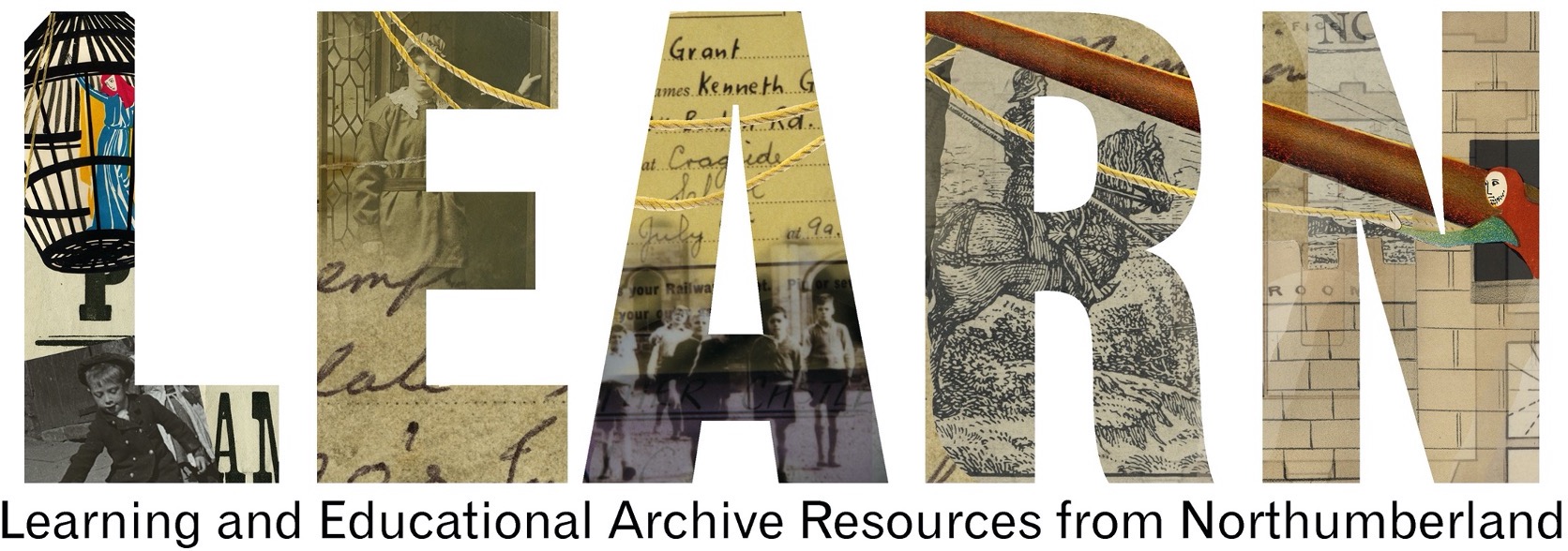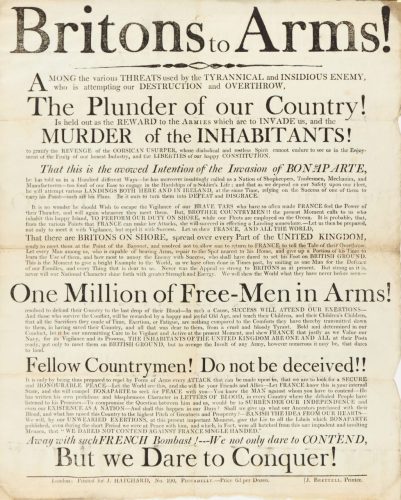Britons to Arms Poster, About 1803
Reference: ZCE/F/4/3/1
Topics: Miltary History, Anglo-French Wars, French Revolutionary Wars, Propaganda
BRITONS TO ARMS
This poster or public notice is undated but was probably produced about 1803. Napoleon Bonaparte (Napoleon I) was a French military general who in 1804 became the first Emperor of France as a consequence of the French Revolution.
In 1802 Britain and France signed the Treaty of Amiens. This brought to an end the French Revolutionary Wars (1792-1802), a series of conflicts across Europe that France fought against Britain and other European states.
Peace was short-lived. In 1803 Britain declared war on France and Napoleon assembled an invasion fleet against Britain. There was a great fear of invasion amongst the population and this poster is a call to arms and declaration of intent of the male populace to defend the country against the French.
The poster makes references to two alleged insults against the British made by Napoleon – that Britain was a nation of shopkeepers, and that the British were ‘too fond of our Ease to engage in the Hardship’s of a Soldier’s Life…’. The reference to shopkeepers suggested that Britain was a commercial nation rather than a military one. Britain’s military power at this time lay with the Royal Navy. During the periods of the French Revolutionary Wars (1793-1802) and the Napoleonic Wars (1803-1815) the power of the Royal Navy was at its height and exceeded that of other European nations.
The poster shows us how fearful of a French invasion the British population was and their resolve to counteract it claiming that one million men were ready to take up arms. The population of Britain in 1801 was 10-5 million people. Reference is made to the Corsican usurper – Napoleon was born in Corsica in 1769. The poster is an attack upon Napoleon personally rather than the French as a nation.
The production of posters and handbills was an important method of circulating information in the 18th and 19th centuries. Newspapers were expensive and taxed by the government. Posters, public notes and handbills could be produced and circulated cheaply and were therefore an effective form of communication.
The poster was printed for J. Hatchard, 190 Piccadilly, London. J. Hatchard was John Hatchard, who founded Hatchard’s Bookshop at 190 Piccadilly in 1797. The shop continues today and is London’s oldest bookshop, now based at 187 Piccadilly. The fact that the poster was printed in London suggests that it was largely circulated there. Local printers in the provinces would produce similar material for local circulation.
ADDITIONAL RESOURCES
Tar – the term Tar or Jack Tar was used to describe a sailor. The term is thought to derive from the fact that tar was used by sailors to pitch or waterproof the ship.
Napoleon Bonaparte
The Campaigns of Napoleon: The Mind and Method of History’s Greatest Soldier by David Chandler (Prentice Hall & IBD, 1973)
Napoleon the Great by Andrew Roberts (Penguin, 2015)
Napoleon: Path to Power 1769-1799 by Philip Dwyer (Bloomsbury, 2008)
Citizen Emperor: Napoleon in Power 1799-1815 by Philip Dwyer (Bloomsbury, 2014)
Napoleonic Wars
The Napoleonic Wars 1803-1815 by David Gates (Modern Digital, 2011)
The Napoleonic Wars: The Rise and Fall of an Empire by Gregory Fremont-Barnes and Todd Fisher (Osprey Publishing, 2004)
A Military History and Atlas of the Napoleonic Wars by Vincent J. Esposito and John Elting (Greenhill Books, 1999)
Britain Against Napoleon: The Organisation of Victory, 1793-1815 by Roger Knight (Penguin, 2015)
In These Times: Living in Britain Through the Napoleonic Wars 1793-1815 by Jenny Uglow (Faber & Faber, 2015)
The Napoleonic Empire by Geoffrey Ellis (Bloomsbury Academic, 2003)
The Napoleonic Wars: A Global History by Alexander Mikaberidze (Oxford University Press, 2020)
Treaty of Amiens
The Amiens Truce: Britain and Bonaparte, 1801-1803 by John D. Grainger (Boydell & Brewer, 2004)
The History of Europe from the Treaty of Amiens in 1802 to the Pacification of Paris in 1815 by Charles Coote (Arkose Press, 2015)
Amiens 1802: The Phoney Peace by D. Johnson (History Today, vol. 52, no.9, 2002)
Propaganda
The Genesis of Napoleonic Propaganda, 1796-1799 by W. Hanley (Columbia University Press, 2008)
Napoleonic Propaganda by Robert B. Holtman (Louisiana State University Press, 1951)
Myth & Reality: A Review of Bonaparte and the British Prints and Propaganda in the age of Napoleon by Jason D. Frost (National Identities, vol. 20 no.3, pp231-233, 2018)


